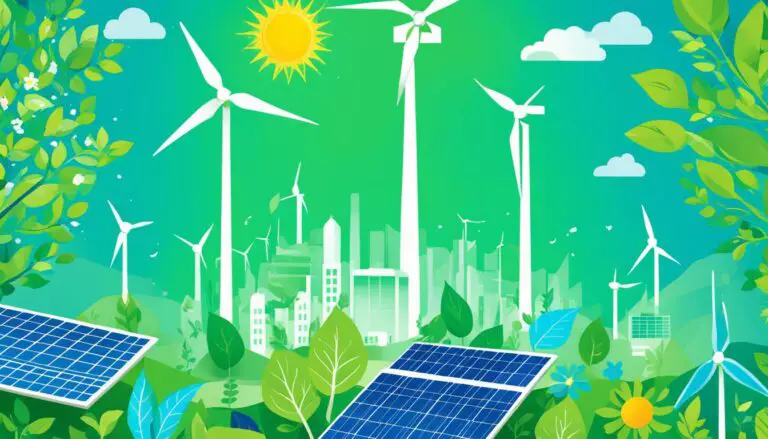People and businesses want to make eco-friendly choices today. Many choose green energy certificates to support sustainability. But, it’s key to know these certificates don’t ensure the electricity used comes from renewable sources.
Green energy certificates were made to help wind and solar farms at first. Now, they let companies look green with little effort or cost. They may boost sustainability claims, but don’t guarantee renewable energy use.
The electricity grid and renewable energy credits (RECs) are complicated topics. RECs let wind and solar farms sell their “greenness” separate from the electricity. This means companies can say they are using renewable energy without truly doing so.
Green energy certificates are good for promoting sustainability and eco-friendly choices. But, we need to look closely at their real impact. Let’s dive into how renewable energy credits work and discuss the concerns around them.
How Renewable Energy Credits Work
Renewable energy credits, known as renewable energy certificates (RECs), help track electricity’s source. It’s hard to tell if a specific kind of electricity was used because it gets mixed on the grid. RECs let wind and solar farms sell their eco-friendly qualities to others. This way, businesses can say they use renewable energy without directly getting their power from green sources.
To show how RECs work, imagine this:
A company, let’s call it ABC, wants to be greener. They aim to cut down on carbon emissions. Instead of getting solar panels, they buy RECs.
Here’s what happens next:
- A solar farm makes clean electricity and adds it to the grid.
- Every unit of this green power creates a REC.
- These RECs are then sold to companies like ABC.
- ABC buys and “retires” them.
- Now, ABC can claim it helps the environment as if it used renewable energy itself.
This system lets firms like ABC back green energy projects and take credit for environmental good. They do so even if their actual power isn’t green. It’s a flexible way for companies to meet eco-friendly goals without having their own green power setup.
The Role and Criticisms of Renewable Energy Certificates
Renewable energy certificates (RECs) are a hot topic in discussions about clean energy. They are used by companies to prove they are eco-friendly. However, people question if they really help in fighting climate change.
The Impact on Climate
Some research shows that RECs don’t do much to boost wind energy, which is vital for cutting carbon emissions. Companies may buy RECs to seem green. But this doesn’t mean they are creating a lot of renewable energy.
“The drop in REC prices has made their revenue insufficient to drive significant growth in green energy production,” says Dr. Julia Green, an environmental scientist at EcoDrive, a leading sustainability consultancy firm. “It’s important to recognize that simply buying RECs does not guarantee a direct reduction in greenhouse gas emissions.”
Green Credentials and Greenwashing
RECs can also lead to greenwashing. This happens when companies use RECs to appear eco-friendly but don’t reduce their own pollution. It’s key for businesses to match their green claims with real action. This ensures honesty and trustworthiness.
“Renewable energy certificates should be seen as just one step towards a sustainable future,” advises Dr. Green. “Companies should explore other strategies such as power purchasing agreements and direct emission reduction to truly make a meaningful impact on the environment.”
Exploring Alternatives
Though RECs have drawbacks, companies have other ways to help the planet. Power purchasing agreements (PPAs) support clean energy projects directly. Also, making your own green energy shows a real promise to a better future.
To be truly green, firms should cut emissions by being more energy-efficient and using renewable energies. This is better than just buying RECs.
Understanding the good and bad about renewable energy certificates is key. This way, businesses and people can choose wisely in moving towards a greener future.
Conclusion
Green energy certificates have made people more aware of the need for sustainability and renewable energy. Yet, their effectiveness in making the grid cleaner is debatable. Companies need to look beyond these certificates to truly lessen their environmental impact.
Creating their own renewable energy and cutting down on emissions can make a bigger difference. While these certificates can make a company look green, they don’t always mean actual reductions in harmful gases.
Companies should prioritize projects that have a real environmental benefit. They should focus on real actions, not just certificates. This way, they can help our world move towards a more sustainable and green future.
FAQ
Are green energy certificates the same as renewable energy certificates (RECs)?
Do green energy certificates guarantee that the electricity being used is from renewable sources?
How do renewable energy certificates work?
Are companies relying only on green energy certificates engaging in greenwashing?
What other strategies can companies explore besides green energy certificates to reduce their carbon footprint?
Source Links
- https://www.cnet.com/home/energy-and-utilities/renewable-energy-certificates-how-anyone-can-enter-the-green-energy-market/
- https://kleinmanenergy.upenn.edu/news-insights/renewable-energy-credits-decarbonizing-the-grid-or-just-a-corporate-messaging-tool/
- https://www.washingtonpost.com/climate-environment/2023/06/21/renewable-energy-credits-certificates-greenwashing/


